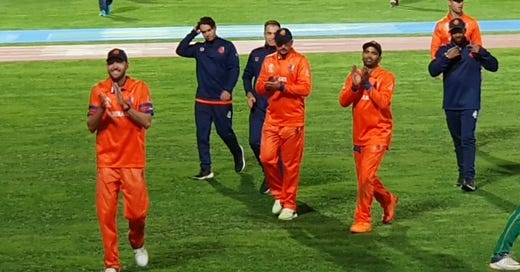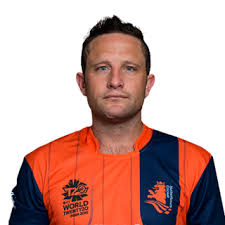There might have been reasons but there were certainly no excuses for a rotten exhibition of bowling, fielding and then batting against the Netherlands. It wasn’t just a bad day at the office. The office was shut for the day while pest control fumigated the building.
More worrying than the 32 extras, including 21 wides, was the apparent inability to ‘read’ the game, adapt to conditions and think on their feet. Every team starts a World Cup match with plans for situations and individual members of the opposition. The ability to change or adapt those plans is as important as the ability to execute them in the first place.
Predictably, the Proteas pace quartet started with the premise that the Netherlands batsmen would be vulnerable ‘upstairs’. Short-pitched bowling to Asian teams and underdogs was a reliable plan, 20 years ago. Just as the Springboks used to prefer running into the opposition and hurting them rather than around them and towards the try line, Proteas fast bowlers regularly targeted bodies rather than stumps. And with some success.
But most Indians and Sri Lankans now play short-pitched bowling as well as anyone, as do the Dutch. Bizarrely, instead of backing their bowling skills in helpful conditions to dismiss the Men in Orange, Kagiso Rabada, Lungi Ngidi and Gerald Coetzee backed their speed. Even when it clearly wasn’t working.
The days between the shocker in Dharamsala and the game against England in Mumbai will provide a huge test of the leadership skills of Rob Walter, Temba Bavuma, the management and senior players. Bavuma made a good start after the game in cautioning against ‘forgetting’ the match or regarding it as a ‘blip’. The players need to accept and embrace the truth – another performance as poor and ill-disciplined as that WILL probably end their campaign.
Anyway, just as England followers could distract themselves after a painful defeat by focussing on the continuingly glorious story of Afghanistan cricket, so South Africans could pay a little more merited attention to the wonderful things being achieved by the Netherlands. Afterall, a good percentage of them are South African.
Roelof van der Merwe was good enough to play ODIs and T20Is for the land of his birth, Sybrand Engelbrecht was a SA under-19 starlet and Colin Ackermann churned out runs at provincial level before focussing on a county career and, when time permitted, international cricket for the Netherlands. And don’t forget Ryan Klein on the subs bench – fine Rondebosch Boys High product.
But it’s Ryan Cook on whom the spotlight should really fall, much to his annoyance. There is a good reason that the head coach is mentioned so little – he wants it that way and insists that the players take the credit for their achievements. The grass grows greenest under the radar and Cook thrives there. He is innovative and creative but relies on the core values of loyalty and hard work.
At the heart of all the Netherlands successes has been the sort of camaraderie which leads teams to become so much more than the sum of its parts. It was the secret to New Zealand’s success for the best part of three decades before they became the brilliant team they are now with no need to punch above its weight.
Over a year ago I was having coffee with Cook in his office at the Gary Kirsten Cricket Academy, at Rondebosch Boys, soon after he received the news that his temporary position as head coach had been made permanent – but not yet announced. I suggested it would be a ‘great experience’ with the proviso that international successes would be very limited. “That,” said Cook, “is exactly the mindset I need to change.”
Many people laughed when (very) part-time off-spinner, Max O’Dowd, took a crib-sheet from his trouser pocket during the match against the Proteas and consulted with captain Scott Edwards. They looked like a couple of amateurs who’d recently been introduced to the concept of ‘match-ups’ but couldn’t remember their notes. It was genius. What do you suppose was going through the heads of the SA batsmen, still spooked by the T20 World Cup defeat?
The extent of the mind games before and during that match – and they were literally ‘games’ rather anything sinister – will no doubt be revealed after the World Cup is over. That’s the Dutch way, respect the opposition but have a little fun while doing everything you can to win. But the Proteas were spooked in Adelaide last year and even more so in Dharamsala on Tuesday.
Jimmy Cook was one of the most prolific opening batsmen of his generation and, for two or three seasons, of all time, for Transvaal and Somerset. Older son, Stephen, was almost equally prolific for the Gauteng Lions before, just as a Test cap seemed to have slipped away, he scored a century against England on a belated debut. He added two more for good measure in just 11 Tests.
All the while Ryan worked away, under the radar, as pleased for Stephen’s success as he was not to be sharing the spotlight which briefly landed on him. Ryan threw balls in the nets, became a specialist fielding coach, invested time and money in the study of sports psychology and worked long hours as an instructor and mentor at Kirsten’s CoachEd programme.
Illness to Dutch coach Ryan Campbell last year resulted in a call to the hot seat, temporarily. The KNBC may be an amateur and slightly haphazard organisation but they were quick to take note that their relief teacher was a diamond. The only downside is that this column may have blown his cover. Apologies, Cooky.
***
Currently in Dubai, land in Mumbai 8:15am on Thursday. Seat 43D wasn’t too bad but Emirates added a pass to the Business Class Lounge. Perhaps they read this column. Thank you, Emirates. Don’t mind if I do have a cheeky glass of Moet…










